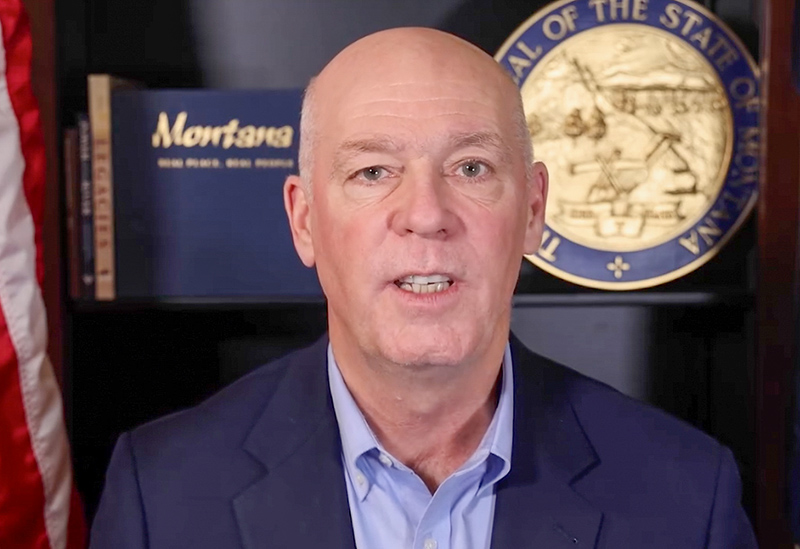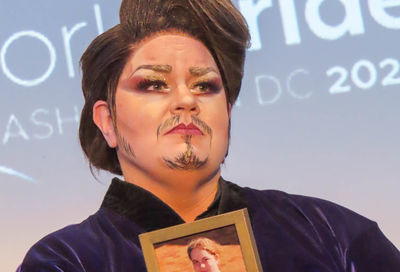Montana Human Rights Bureau finds Yellowstone County discriminated against trans employee
Complaint alleges county's insurance exclusion on transition-related care constitutes a form of sex discrimination
By John Riley on April 5, 2019 @JRileyMW

The Montana Human Rights Bureau has found that a transgender woman working for Yellowstone County was discriminated against when her employer-provided health plan refused to pay for gender-affirming health care.
Eleanor Andersen Maloney, an attorney for Yellowstone County’s Department of Public Health and Human Services, sought help after being diagnosed with gender dysphoria in September 2017.
She sought counseling from a doctor, but was later informed that the county — which had initially approved coverage for their therapy sessions — would no longer allow her to use her insurance to pay for her therapy due to an exclusion prohibiting the plan from covering procedures or treatments related to a gender transition.
Maloney also sought pre-approval for a consultation with a surgeon to undergo gender confirmation surgery, but was informed that, due to that same exclusion, she would not be able to obtain pre-approval and would have to pay out of pocket if she insisted on moving forward with any surgery.
Maloney sent a letter seeking pre-approval for specific transition-related procedures. A month later, she received a letter denying her request, at which point she appealed the decision and even arranged a meeting with Yellowstone County commissioners to request that they remove the insurance exclusion from the employee health plan.
Maloney eventually resigned her position, citing the denial of care as the sole reason for her resignation. She then filed two grievances, one with the county attorney and another with the county’s human resources department, alleging that the denial of care constituted a form of unlawful discrimination. She also received a letter from the county denying her earlier appeal. So she enlisted the help of the ACLU of Montana to file a complaint with the state’s Human Rights Bureau.
According to the complaint, the denial of Maloney’s treatments based on her transgender identity constitutes a form of sex discrimination. It alleges that gender identity discrimination is a form of sex discrimination, which is illegal under Montana’s Human Rights Act, the Montana Constitution, the U.S. Constitution, Title VII of the Civil Rights Act, and the Affordable Care Act.
In addition, Montana’s Medicaid policy explicitly covers gender-affirming health care for transgender people, meaning it would not be extraordinarily difficult or unusual for county governments to offer similar benefits without trans-specific exclusions.
“[I]f an insurance product carves out medical procedures, relying only on a person’s status as transgender as the determinative criterion, this is a distinction based on sex and it violates the Montana Human Rights Act’s insurance provision,” the Human Rights Bureau wrote in its findings, released Thursday. “…If Montana has a statute that says an insurance product cannot discriminate on the basis of ‘sex’ and an insurance product denies coverage for procedures involved in changing from one sex to another sex, it seems like a leap of logic to argue this is not ‘sex’ discrimination.”
The ACLU of Montana celebrated the decision.
“It’s very simple: discrimination on the basis of gender identity is illegal,” Elizabeth Ehret, an attorney for the ACLU of Montana. “Yet, the only reason Ms. Maloney was denied coverage for her healthcare was because of her gender identity. We are pleased with the findings of the Montana Human Rights Bureau and hope this leads to a change in Yellowstone County’s policy.”
Even though Maloney has since found a new job with a health care plan that does not contain a transgender exclusion, she still believes it is important to ensure Yellowstone County changes its policy for other transgender employees who may be hired in the future.
“I was denied medically necessary coverage because of an outdated and discriminatory insurance practice,” she said in a statement. “It hurts to be treated differently just because of who you are.”
Yellowstone County, which has previously argued it is justified in keeping the exclusion in place because there is no state or federal law explicitly prohibiting discrimination based on gender identity, has 30 days to respond to the Bureau’s most recent decision. If the county and Maloney are unable to work out an agreement, the case will move on to the Hearings Bureau for a formal hearing.
Montana Governor Signs Anti-Trans Bills into Law
Montana Gov. Greg Gianforte has signed two bills banning transgender people from bathrooms matching their gender and from women's sports.
By John Riley on March 30, 2025 @JRileyMW
Montana Gov. Greg Gianforte signed two anti-transgender bills into law, one of which bars transgender people from public restrooms matching their gender identity and the other banning transgender women and girls from female-designated sports teams.
The laws were passed on party-line votes in both legislative chambers, with Republicans voting in the affirmative.
The first law requires public schools, correctional facilities, other public buildings -- including the state Capitol -- and domestic violence shelters to designate bathrooms, changing facilities, and sleeping areas for a single sex -- male or female. Entry to such spaces will be based on a person's assigned sex at birth, as determined by a person's chromosomal makeup.
White House Demands NIH Study Transgender Transition “Regret”
The Trump administration wants the NIH to study the effects of transitioning to justify its restrictions on gender-affirming care.
By John Riley on April 14, 2025 @JRileyMW
The Trump administration has ordered the U.S. National Institutes of Health (NIH) to study the physical and mental health effects of transitioning, both socially and medically.
In an internal NIH memo obtained by National Public Radio, Acting NIH Director Mark Memoli declared that the agency should study the impact of "social transition and/or chemical and surgical mutilation" among trans-identifying children.
Specifically, the White House wants the NIH to study "regret" and rates of so-called "detransition" among children and adults who have previously transitioned.
Republicans join Democrats to Defeat Anti-Drag, Anti-Trans Bills
Montana lawmakers have rejected a pair of bills seeking to ban drag in the state and remove trans children from their parents' custody.
By John Riley on March 10, 2025 @JRileyMW
Lawmakers in the Montana House of Representatives defeated two anti-LGBTQ bills last week after the chamber's transgender and nonbinary representatives gave impassioned speeches protesting the measures.
State Rep. Zooey Zephyr (D-Missoula), the legislature's first out transgender representative, spoke out against House Bill 675, sponsored by Rep. Caleb Hinkle (R-Belgrade), which sought to ban drag performances and Pride parades in Montana.
Hinkle previously sponsored a ban on public performances of a "sexual nature" that was specifically intended to target drag shows and Drag Queen Story Hour-type events (even if they do not contain sexually explicit content).
Support Metro Weekly’s Journalism
These are challenging times for news organizations. And yet it’s crucial we stay active and provide vital resources and information to both our local readers and the world. So won’t you please take a moment and consider supporting Metro Weekly with a membership? For as little as $5 a month, you can help ensure Metro Weekly magazine and MetroWeekly.com remain free, viable resources as we provide the best, most diverse, culturally-resonant LGBTQ coverage in both the D.C. region and around the world. Memberships come with exclusive perks and discounts, your own personal digital delivery of each week’s magazine (and an archive), access to our Member's Lounge when it launches this fall, and exclusive members-only items like Metro Weekly Membership Mugs and Tote Bags! Check out all our membership levels here and please join us today!
The Magazine
-
Most Popular
 Signature Honors Mandy Patinkin in Emotional Celebration
Signature Honors Mandy Patinkin in Emotional Celebration  Gay Army Reserve Officer in Uniform Sex Video Scandal
Gay Army Reserve Officer in Uniform Sex Video Scandal  A Potent (and Pricey) 'Good Night, And Good Luck'
A Potent (and Pricey) 'Good Night, And Good Luck'  Sarah Snook is Astonishing in Broadway's 'Dorian Gray'
Sarah Snook is Astonishing in Broadway's 'Dorian Gray'  MISTR's Free DoxyPEP Leads to Huge Drop in STI Rates
MISTR's Free DoxyPEP Leads to Huge Drop in STI Rates  Jared Polis Signs Law Repealing Colorado's Gay Marriage Ban
Jared Polis Signs Law Repealing Colorado's Gay Marriage Ban  Becca Balint: The Pride of Vermont
Becca Balint: The Pride of Vermont  'Gray Pride' Protests Hungary's Ban on Gay Pride Marches
'Gray Pride' Protests Hungary's Ban on Gay Pride Marches  Hugh Bonneville Delivers a Show-Stopping Vanya
Hugh Bonneville Delivers a Show-Stopping Vanya  Police Barge into Walmart Restroom to Confront Butch Lesbian
Police Barge into Walmart Restroom to Confront Butch Lesbian
 Becca Balint: The Pride of Vermont
Becca Balint: The Pride of Vermont  Signature Honors Mandy Patinkin in Emotional Celebration
Signature Honors Mandy Patinkin in Emotional Celebration  MISTR's Free DoxyPEP Leads to Huge Drop in STI Rates
MISTR's Free DoxyPEP Leads to Huge Drop in STI Rates  A Potent (and Pricey) 'Good Night, And Good Luck'
A Potent (and Pricey) 'Good Night, And Good Luck'  Sarah Snook is Astonishing in Broadway's 'Dorian Gray'
Sarah Snook is Astonishing in Broadway's 'Dorian Gray'  'Gray Pride' Protests Hungary's Ban on Gay Pride Marches
'Gray Pride' Protests Hungary's Ban on Gay Pride Marches  Jared Polis Signs Law Repealing Colorado's Gay Marriage Ban
Jared Polis Signs Law Repealing Colorado's Gay Marriage Ban  White House Ignores Reporters with Pronouns in Email Signatures
White House Ignores Reporters with Pronouns in Email Signatures  White House Demands NIH Study Transgender Transition "Regret"
White House Demands NIH Study Transgender Transition "Regret"  Air Force Reverses Ban on Pronouns in Email Signatures
Air Force Reverses Ban on Pronouns in Email Signatures
Scene
Metro Weekly
Washington's LGBTQ Magazine
P.O. Box 11559
Washington, DC 20008 (202) 638-6830
About Us pageFollow Us:
· Facebook
· Twitter
· Flipboard
· YouTube
· Instagram
· RSS News | RSS SceneArchives
Copyright ©2024 Jansi LLC.











You must be logged in to post a comment.